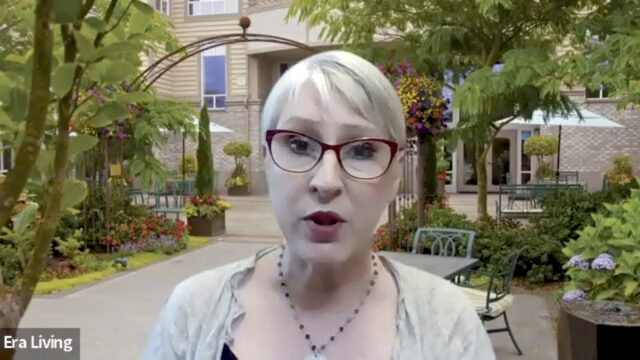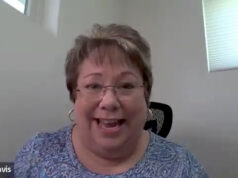Suzanne: And welcome everyone to Answers for Elders Radio Network heard across the USA. And we are so excited to come to you every week to talk about various aspects of aging. But if you’re in that lower age group — maybe a late stage or early stage baby boomer, maybe in your seventies or early seventies — you may be thinking about the future What could happen if you decide you can’t live independently anymore? What happens if you need care in the future? A lot of us tend to just ignore it until it’s too late. And oftentimes what could happen is if you ignore it for too long, what can happen is you don’t have choices. And so this hour is gonna be all about empowering you as an individual, as a senior to start making decisions. And I am hopeful that we can shed some light on what it’s like when you move into that next chapter of your life. And we are honored to have an amazing guest who I have known for many years who is definitely somebody that I respect, who is at the top of her field, and she is Tina Hall from Era Living and Tina, welcome to Answers for Elders.
Tina Hall: Thank you very much Suzanne. It is an honor to be with you today.
Suzanne: I am so glad you’re here. And Tina, you work for senior living organizations and you speak with families all across the U.S. or the area that you serve and you’re primarily in the greater King County area [of Seattle, Washington], but you probably talk to sons and daughters that live out of town that may live elsewhere that are looking for a place for their loved one. So I love your approach and I love your ethics and your integrity about how you serve seniors.
And so to have these kind of conversations, I really wanted to talk to somebody who’s an expert in this area that talks to families that has this dialogue, and what we’re finding is, at least in our world, is a lot of people in their seventies aren’t even thinking about it. It’s not even on their radar of what’s gonna happen in my future. So what are some of the main things that you’re hearing, Tina?
Tina Hall: I think people don’t think about what is going to happen in the future because we all have this picture in our head of how we’re going to age, and we’re all going to be perfectly healthy, and have no problems of any kind. And we’re gonna die peacefully in our sleep at 100. Realistically for most of us, it’s not gonna go quite like that. And so thinking about the future is really vital so that you can start to make plans, or backup plans, or a backup backup plan. But even if an individual is not sure if they ever want to move to a senior living community, it is a really good idea to educate yourself on what your options are. and what that whole journey might look like in the event that at some point in the future, it is something that makes sense in your life.
Suzanne: And without a doubt, no matter what is the right choice for you, you’re gonna have a new chapter in your life. There’s going to come a time where — I don’t care how old you get — it’s going to be an issue sometime in your life that you likely will not be able to care for yourself independently. You’re going to need care of some sort. And that’s just a part of aging, right? And so looking at that picture, we don’t want to think about aging. We don’t want to think about getting older. I mean, every single TV show and everything like that is all about youth, it’s our culture. But there’s so much wisdom in being older and as an achievement.
Tina Hall: Yes.
Suzanne: And we love to hear the stories of our seniors and the types of lives that they’ve lived, the impacts that they’ve had on the world, and they matter, and you matter as a listener, and to think about your life and think about what you want, we want you to be empowered to make those choices. And that happens in early planning. It has the ability to sit down with your family and say this is my choice. I have made a plan, this is how I wanna work. And so we’re gonna talk this hour a little bit about what those steps are. How do you make those transitions, and how do you have these conversations with your family to get everybody on the same page? Which sometimes is a challenge at times. So, Tina, how do you know when it’s time to just start the journey?
Tina Hall: For everybody it’s a little bit different. But even if there is not a specific trigger as something that’s happening in your life, that would indicate its time, I always recommend people just start thinking about it in any case, but there definitely are a few things to get your mind thinking about it. Consider how does your life compare now to how it was five years ago? Are you as active? Are you as mobile? Are you able to do all the things you used to do? And what is the likely progression going to be within, say the next five years or 10 years? You know, in the history of the world, none of us are getting younger unless you’re Benjamin Button, and I don’t think anybody is, so considering how things are gonna change is important.
Another big thing to think about is, are you still driving? Are you, are you able to get out and do the things that you used to do or are you starting to become more isolated? One of the things that people don’t realize is a big indicator of your physical health in the future is your emotional and your social health, and that has so much to do with whether or not you are connected and engaged with other people. And, and you have purpose and things to do. If you are finding that your world is becoming smaller, because perhaps you live in an area where it’s difficult for people to get to you, or you’re not driving, and so you’re not getting out to church, or you’re not easily getting to the grocery store even, if your social life has shrunk to a point where you’re not seeing people very often, this can be really, really difficult on your health.
Suzanne: And not only that, there are studies that show that if you have a tendency to having dementa in your in your family — or your heritage, or anything that may trigger amyloids in the brain to start producing itself — what’s gonna happen is, that isolation is going to accelerate that type of a situation. It’s like isolating and a TV doesn’t work. TV is not a social outlet. So it’s finding those ways in which you can connect with those that share interests, that you can be fed, you can stretch your mind, and your mental capacity, and have conversations about things that interest you, whether it’s ethnic groups, or political groups, or church groups, or anything like that, that you may be connected to, those things are important.
And so we’re gonna talk a little bit today about how to start these conversations. And first I think the first thing — and Tina, you’re gonna agree with me — is you need to think about what you want. If you were in a situation where you could not take care of yourself, what would you want, and what would be realistic? And there’s a lot of considerations in going into what you want. And that may be your specific financial situation, your health care options in the future, how all of those things fall into place together.
So Tina, you are with Era Living, and you have eight communities throughout Greater Puget Sound. And you were also for those of you that listen to our podcast and we hope you. Her organization has many podcasts on Answers for Elders. And if you’re interested in learning a little bit about the culture of Era Living, but also just the culture of senior living, I think this is an important time for all of us to start thinking about, what is it that we want in our lives? So, Tina, what areas are you in, in King County?
Tina Hall: Four of our communities are in North Seattle, and those are Aljoya Thornton Place, University House Wallingford, Ida Culver House Broadview, and Ida Culver House Ravenna. And then a little further afield we have Aljoya Mercer Island, University House Issaquah, The Gardens at Town Square — which is in downtown Bellevue — and then in South Seattle, just a little bit north of Renton on Lake Washington, is our Lakeshore community. So it’s a relatively small footprint. But I love that about the company. It’s small, it’s family owned. And so we really have an opportunity to pivot quickly, and adapt to what our residents want. Since there’s not lots of layers we need to wade through.
Suzanne: That is absolutely true. Locally owned in many cases is so important, because they understand the culture, they understand the economy, they understand what’s going on. There’s a real connection to what’s going on, rather than a large chain that might be based somewhere that doesn’t even come here anymore, anywhere. So anyway, to all of you, Tina, and I will be right back right after this.














